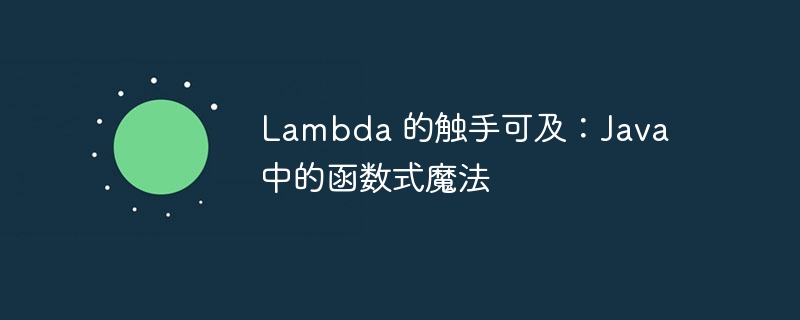

php editor Zimo brings you an article about functional programming in Java, titled "Lambda at your fingertips: Functional magic in Java". This article will delve into the application of Lambda expressions in Java and the magic of functional programming. Through this article, readers will learn how to use Lambda expressions to simplify code, improve efficiency, and explore the charm of functional programming. Let us uncover the mystery of functional programming in Java and explore the magical beauty of Lambda.
Lambda expressions are defined by the following syntax:
(parameters) -> expression
in:
parameters is a comma-separated list of formal parameters, which can be empty. expression is the expression to be executed. Use Lambda expression to implement sorting
Traditionally, anonymous inner classes are used to implement sorting:
Collections.sort(list, new Comparator<Integer>() {
@Override
public int compare(Integer a, Integer b) {
return a - b;
}
});Using Lambda expressions, the code can be significantly simplified:
Collections.sort(list, (a, b) -> a - b);
Use Lambda expressions to process collections
Java 8 also introduces Stream api, which provides a series of powerful operations to handle collections. Lambda expressions play a crucial role in the Stream API, allowing filters, mapping, and reduction operations to be applied in a concise manner.
For example, the following code uses a Lambda expression to filter even numbers in a collection:
List<Integer> evenNumbers = list.stream() .filter(n -> n % 2 == 0) .collect(Collectors.toList());
Use Lambda expressions to process functions
Lambda expressions can also be used to represent functions. This is very useful in functional programming, where it allows functions to be passed as arguments to other functions. For example, the following code uses a Lambda expression to convert a
string to uppercase:
function accepts a function as a parameter that converts a string to uppercase.
The above is the detailed content of Lambda at your fingertips: functional magic in Java. For more information, please follow other related articles on the PHP Chinese website!String uppercasedString = convertToStringUpperCase(s -> s.toUpperCase());
Simplicity:
Limitations of Lambda expressionsType inference:
Best PracticesUse named Lambda expressions:




